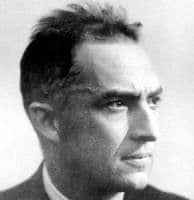William Carlos Williams
Earlier this year I read Wendell Berry’s The Poetry of William Carlos Williams of Rutherford, a collection of essays and reflections about a theme in the life of “the poet of Rutherford” that is near to Berry’s own heart. That theme is place, or what Berry refers to as “local adaptation, ” and he explicitly says that his purpose in writing the book was to examine “Williams’ lifelong effort to come to terms with, to imagine, and to be of use to his native and chosen place.”
It is that phrase “to be of use to” that I want to consider here. For those of us interested in poetry, we tend to think in terms of poets as “poets” or writers before we think of them as people with lives, and sometimes lives where they excelled at things other than poetry. Williams was known as a doctor (specifically, a pediatrician) before he became known as poet. And he was a doctor in Rutherford, New Jersey, and he was “of use” as a doctor before his poetry helped put Rutherford on the map.
The biography of Williams posted by The Poetry Foundation recognizes the importance of his medical career to his poetry: “A doctor for more than forty years serving the New Jersey town of Rutherford, he relied on his patients, the America around him, and his own ebullient imagination to create a distinctively American verse.”
Williams wrote more than poetry, including essays, articles, and short stories, and even a collection of short stories about the practice of medicine collected in a volume called The Doctor’s Stories. Yet you can’t read his poetry for long before you notice allusions to medicine, hospitals and doctors. Even in his famous prose/verse work Spring and all (1923), you can find the direct references:

under the surge of blue
mottled clouds driven from the
northeast – a cold wind. Beyond, the
waste of broad muddy fields
brown with dried weeds, standing and fallen
patches of standing water
the scattering of tall trees
All along the road the reddish
purplish, forked, upstanding, twiggy
stuff of bushes and small trees
with dead brown leaves under them
leafless vines –
Lifeless in appearance, sluggish
dazed spring approaches…
It’s not only the direct references. His poems are written with a keen, observing eye: the eye of a doctor, a physician who can’t always rely on what his patients tell him or what he can directly observe, because he knows so much may be hidden and unknown.
On a wall at St. Mary’s Hospital in Rutherford, a plaque has been placed recognizing Williams for both his poetry and his practice of medicine. “We walk the wards where Williams walked, ” it reads. “William Carlos Williams, 1883-1963, Poet Physician, Member of This Medical Staff 1924-1963.” And then it concludes with a quote by the poet physician: “The poem springs from the half-spoken words of the patient.”
The poetry of William Carlos Williams cannot really be separated from his work as a physician. I suspect his work as a physician cannot be separated from his poetry, either. Both are facets of the same person, a whole person, and man who wrote poetry with a doctor’s eye and practiced medicine with the compassion of a poet.
And so question: can you see how your own everyday work influences and structures your writing, whether it is poetry, fiction, non-fiction or all of the above? Can you find similarities in how you do work and how you write?
Photograph by Kelle Sauer. Used with permission. Poetry at Work post by Glynn Young.
You Might Like
Poetry at Work Day
Walk to Work With a Poet: The Wallace Stevens Walk
How to Read a Poem uses images like the mouse, the hive, the switch (from the Billy Collins poem)—to guide readers into new ways of understanding poems. Anthology included.
“I require all our incoming poetry students—in the MFA I direct—to buy and read this book.”
—Jeanetta Calhoun Mish
- Poets and Poems: Peter Murphy and “You Too Were Once on Fire” - October 14, 2025
- “Your Accent! You Can’t Be from New Orleans!” - October 9, 2025
- Poets and Poems: Donna Vorreyer and “Unrivered” - October 7, 2025


Charity Singleton says
Glynn – What a beautiful piece. When I read “poet doctor,” I thought of Wendell Berry himself who is called “poet farmer,” and I wondered, as you do in the closing there, whether I am equal parts writer and data analyst, equal parts writer and social media marketer, or if I have worked so hard to keep my identities separated that the title would never apply to me so easily as it does to Williams or Berry. Maybe this is the true work of poetry and writing – to link to everything we are.
Great work, friend!
Glynn says
It’s a kind of modernist thing to do – segment ourselves into a work person, a home person, a church person, a party person, etc. We are all of a piece. Thanks for the comment, Charity.
Martha Orlando says
Wonderful essay, Glynn!
I don’t know how a writer can ever separate him or her self totally from what they are writing. Experiences and characters may be fictionalized, of course, but there is always something of the writer’s personality and outlook in the final product.
Blessings to you!
Glynn says
A few months after my novel was published, my wife commented that I was all over that book. I was surprised – I’m not an Anglican priest, I’ve never competed in the Olympics, I’ve never lived in Edinburgh or San Francisco — I couldn’t figure out what she was talking about. So I reread it carefully, and discovered she was right. I was.
Thanks for reading and commenting.
Maureen Doallas says
Fine essay, Glynn.
After reading “Something Urgent I Have to Tell You”, the recent bio of Williams, I came away with a new appreciation for how complicated a person Williams was. He clearly wanted renown and yet was rooted to place, practicing medicine among relatively poor patients to whom he seemed to be intensely devoted. His personal life is in a lot of his work.
Every writer draws from his or her own life, which provides the experience to illuminate the writing. Being a doctor offered Williams plenty of “good copy”, so to speak.
Glynn says
I will have to read that bio. I really didn’t know much about him until I bought a reprint of “Spring and all.” And then the Berry book.
Thanks for reading, Maureen.
Maureen Doallas says
I found the book a bit of a slog. Leibovitz has a take on Williams’s work that I had not been exposed to in others’ perspectives on his work, and he spends quite a bit of time on work that is not poetry. That said, he covers his ground deeply.
Chris Yokel says
Great point, Glynn. Sometimes I wish all I could do was write as a profession, but then I do wonder, where would my inspiration come from? Or how would I write differently if that’s all I did, as opposed to finding those special moments now in the midst of other work.
Glynn says
Chris, someone once said that about three poets in the United States could support themselves on sales of their poetry books. It’s an exaggeration, but likely true in a very general sense. So we do other things, and we drawn inspiration from what we do. Thanks for reading.
davis says
We try to separate one thing from another in our lives, and yet it continues blended as the colours of a sunset sky.
Megan Willome says
Amen!
Glynn says
No matter how hard we try, we can separate ourselves into pieces. Just doesn’t work. Thanks for reading and commenting (and amening).
L. L. Barkat says
“His poems are written with a keen, observing eye: the eye of a doctor, a physician who can’t always rely on what his patients tell him or what he can directly observe, because he knows so much may be hidden and unknown”
I love this.
I could see it as something we try to write about ourselves….
“her poems are written with…”
“his poems are written with…”
you know? 🙂
Glynn says
While I was reading the Berry book, it struck me how much like a physician a poet was. Or at least how much the eye of a poet was like the eye of a physician. Although if I needed surgery, I think I turn to a doctor rather than a poet. 🙂
Donna says
Glynn…. This is juicy. A lot to consider here! Only yesterday I asked myself ‘gee I wonder if anyone hears Dr Seuss in my poems like I do…. WHY does my stuff come out that way?’
So if a Dr reveals himself in his poetry why shouldn’t someone who had been immersed in Early Childhood Education be revealed in a similar way? LL you ask a powerful question.
Glynn I love what you said near the end about the facets of one man…. The compassion he brought to his medicine and his poetry are from one heart.
Glynn says
Donna, we write with our whole lives, even if we try consciously not to. It’s how we’re made, and how our mind things.
Thanks for reading and commenting.
Donna says
I don’t know why it comes as such a surprise to me, but it does, and I’m grateful for the persepctive. 🙂 (and just to say my comment is mixed up… there was a facebook or twitter post w a question by I think LL but not sure… sorry to be confusing. I can’t find the post now, but it’s related).
Z Code System says
Hello! Do you know if they make any plugins to help with SEO?
I’m trying to get my blog to rank for some targeted keywords but I’m
not seeing very good gains. If you know of any please share.
Kudos!